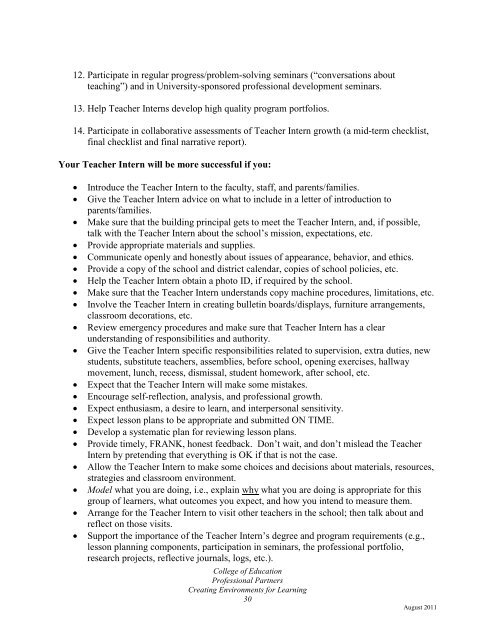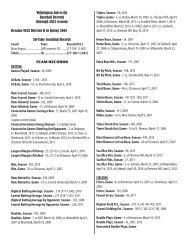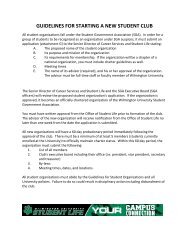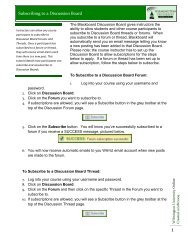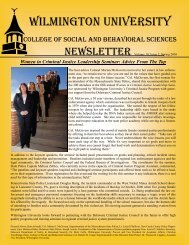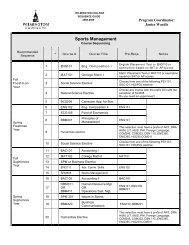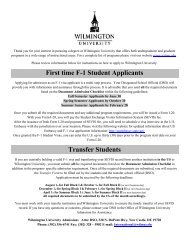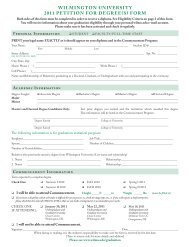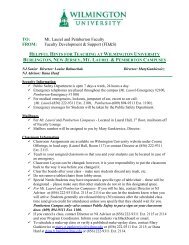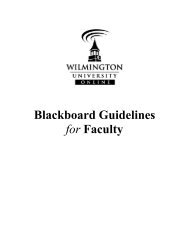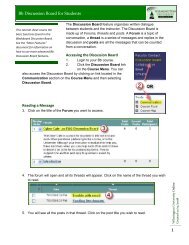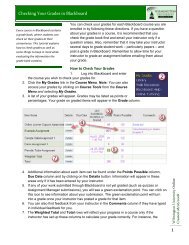handbook for cooperating teachers - Wilmington University
handbook for cooperating teachers - Wilmington University
handbook for cooperating teachers - Wilmington University
You also want an ePaper? Increase the reach of your titles
YUMPU automatically turns print PDFs into web optimized ePapers that Google loves.
12. Participate in regular progress/problem-solving seminars (“conversations aboutteaching”) and in <strong>University</strong>-sponsored professional development seminars.13. Help Teacher Interns develop high quality program portfolios.14. Participate in collaborative assessments of Teacher Intern growth (a mid-term checklist,final checklist and final narrative report).Your Teacher Intern will be more successful if you:Introduce the Teacher Intern to the faculty, staff, and parents/families.Give the Teacher Intern advice on what to include in a letter of introduction toparents/families.Make sure that the building principal gets to meet the Teacher Intern, and, if possible,talk with the Teacher Intern about the school’s mission, expectations, etc.Provide appropriate materials and supplies.Communicate openly and honestly about issues of appearance, behavior, and ethics.Provide a copy of the school and district calendar, copies of school policies, etc.Help the Teacher Intern obtain a photo ID, if required by the school.Make sure that the Teacher Intern understands copy machine procedures, limitations, etc.Involve the Teacher Intern in creating bulletin boards/displays, furniture arrangements,classroom decorations, etc.Review emergency procedures and make sure that Teacher Intern has a clearunderstanding of responsibilities and authority.Give the Teacher Intern specific responsibilities related to supervision, extra duties, newstudents, substitute <strong>teachers</strong>, assemblies, be<strong>for</strong>e school, opening exercises, hallwaymovement, lunch, recess, dismissal, student homework, after school, etc.Expect that the Teacher Intern will make some mistakes.Encourage self-reflection, analysis, and professional growth.Expect enthusiasm, a desire to learn, and interpersonal sensitivity.Expect lesson plans to be appropriate and submitted ON TIME.Develop a systematic plan <strong>for</strong> reviewing lesson plans.Provide timely, FRANK, honest feedback. Don’t wait, and don’t mislead the TeacherIntern by pretending that everything is OK if that is not the case.Allow the Teacher Intern to make some choices and decisions about materials, resources,strategies and classroom environment.Model what you are doing, i.e., explain why what you are doing is appropriate <strong>for</strong> thisgroup of learners, what outcomes you expect, and how you intend to measure them.Arrange <strong>for</strong> the Teacher Intern to visit other <strong>teachers</strong> in the school; then talk about andreflect on those visits.Support the importance of the Teacher Intern’s degree and program requirements (e.g.,lesson planning components, participation in seminars, the professional portfolio,research projects, reflective journals, logs, etc.).College of EducationProfessional PartnersCreating Environments <strong>for</strong> Learning30August 2011


